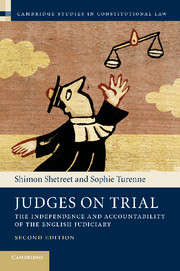Book contents
- Frontmatter
- Contents
- Foreword
- Acknowledgments
- Table of cases
- Table of legislation
- List of Abbreviations
- 1 Introduction
- 2 Constitutional steps towards judicial independence
- 3 The structure and governance of the English judiciary
- 4 Judicial appointments
- 5 Standards of conduct on the bench
- 6 Standards of conduct in extra-judicial activities
- 7 Immunity, discipline and removal of judges
- 8 Freedom of expression and public confidence in the judiciary
- 9 Conclusions
- Annex 1 Courts and tribunals structure
- Index
- References
9 - Conclusions
Published online by Cambridge University Press: 05 June 2014
- Frontmatter
- Contents
- Foreword
- Acknowledgments
- Table of cases
- Table of legislation
- List of Abbreviations
- 1 Introduction
- 2 Constitutional steps towards judicial independence
- 3 The structure and governance of the English judiciary
- 4 Judicial appointments
- 5 Standards of conduct on the bench
- 6 Standards of conduct in extra-judicial activities
- 7 Immunity, discipline and removal of judges
- 8 Freedom of expression and public confidence in the judiciary
- 9 Conclusions
- Annex 1 Courts and tribunals structure
- Index
- References
Summary
9.1 Judicial independence has carried different meanings throughout history, just as social standards differ with the economic and political environment. This book has focused on the importance of the institutional checks and balances over the judiciary and their practice in England, with the purpose of exploring the modern meaning of judicial independence. Our analysis is developed in the context of England and Wales. This does not imply that any meaning of judicial independence is deeply entrenched in any given society and cannot be measured under a common standard. Rather, judicial independence is perhaps best understood in relation to the background of any given society. It will have a different meaning in a jurisdiction where judges are appointed from the ranks of practising lawyers in comparison to a jurisdiction where there is no distinction between barristers and solicitors, and where judges are appointed and trained for their roles from graduation. Thus, the contemporary features of the English judiciary are its constitutionalisation under the Constitutional Reform At 2005 (CRA), the managerialism that is now attached to the judicial office and its professionalisation.
Beyond the particular scrutiny of the English judiciary, the analysis of this book would confirm the insight that judicial independence is underpinned by a cluster of principles whose weight varies against the history and constitutional background of any given society. These principles have been examined in turn, through successive chapters, and in relation to each other. Separation of powers, merit and fair reflection of society in appointments, and impartiality in the exercise of the judicial function are core values which sustain judicial independence; judicial tenure, an adequate salary and the principle of immunity from civil liability in the discharge of the judicial office complete this set of constraints upon judges and others in the name of judicial independence.
- Type
- Chapter
- Information
- Judges on TrialThe Independence and Accountability of the English Judiciary, pp. 419 - 429Publisher: Cambridge University PressPrint publication year: 2013



